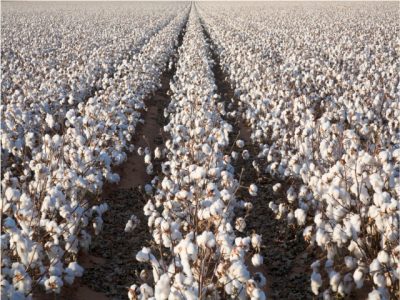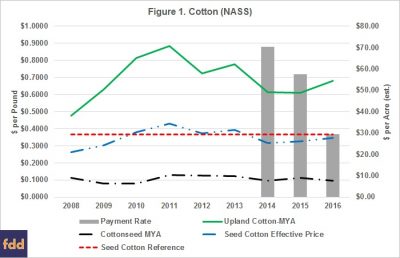The House Agriculture Committee unveiled a draft farm bill Friday that would revamp a key international food aid program, boost risk management options for specialty crop growers and nullify California's…
Cottonseed Included in Title I of the Farm Bill
A budget agreement reached last week included language that paves the way for cotton producers to participate in Title I commodity programs of the Farm Bill. After previous unsuccessful attempts to facilitate this change to the 2014 Farm Bill, the new provision allows cottonseed to be an eligible program commodity effective with the 2018 crop year.
Cottonseed Coverage in Title I of the Farm Bill- Brief Background
Due to a World Trade Organization (WTO) ruling in favor of Brazil over U.S. cotton subsidies, the 2014 Farm Bill removed upland cotton from Title I program benefits (Agriculture Risk Coverage (ARC) and Price Loss Coverage (PLC)).
Back in December of 2015, lawmakers urged then Secretary of Agriculture Tom Vilsack to “use his authority under the Farm Bill to designate cottonseed an oilseed, allowing farmers who produce cottonseed to access the same risk management tools available under the Farm Bill to other oilseed farmers.”
In February 2016, Sec Vilsack explained why he denied this request.

At a House Agriculture Subcommittee hearing in April of 2017, Georgia farmer Ronnie Lee, the Chairman of the National Cotton Council, indicated that, “Cotton policy in the 2014 Farm Bill was enacted largely in response to a [WTO] trade challenge brought by Brazil against certain components of U.S. farm policy and select cotton-specific policies.
Support can be provided for cottonseed without running afoul of the agreement with Brazil that settled the WTO case and without violating U.S. commitments under the WTO. We strongly believe we need a cottonseed policy in place to help provide support to our producers as a bridge until the new farm bill is enacted, hopefully before the expiration of the current bill in 2018.
Also in April of last year, a Bloomberg news article reported that, “Some cotton farmers have said the USDA income support program created in the 2014 farm bill, the Stacked Income Protection Plan, is inadequate and hasn’t provided the protection intended. The cotton industry has pushed for its crop to be covered in the subsidy programs offered in Title 1 of the farm bill, similar to other commodities.”
A potential legislative opportunity to adjust Farm Bill language regarding cotton programs occurred in May 2017, when an Omnibus Appropriations measure was considered by lawmakers. But, the cotton language was omitted from the final compromise. House Ag Committee Chairman Mike Conaway (R., Tex.) noted at the time that, “I want to reassure the nation’s farmers and ranchers that I and many of my colleagues are fully committed to correcting this wrong and seeing them through their current economic challenges.”
More recently, at the end of 2017, a hurricane and wildfire disaster relief package included language that would declare ‘seed cotton’ eligible for farm subsidies. However, the Los Angeles Times reported on December 21st that, “The disaster aid package, the largest in U.S. history, ran into trouble. It passed the House, 251 to 169, on a bipartisan vote, but was blocked in the Senate, where it required 60 votes, under pressure from two directions.”
A farmdoc daily article from January 11th (“Reviewing the Latest Cotton Proposal“) discussed the provisions in the disaster bill relating to cottonseed in more detail and noted in part that, “…[I]t has to be acknowledged that this proposal is a highly unusual and potentially consequential change to farm policy. It sets a rare precedent by opening a farm bill and revising the standing statutory provisions through any appropriations vehicle; more so given it is a temporary supplemental appropriation for natural disasters…Moreover, when CBO makes the 2018 baseline estimate it will necessarily include seed cotton payment estimates and thus increase the commodity title baseline for the upcoming farm bill debate but without the offset requirement if this provision were added during a farm bill debate.”

Cotton, Farm Bill- Current Developments
On Thursday, DTN Ag Policy Editor Chris Clayton reported that, “The federal government shutdown briefly early Friday morning before the U.S. Senate and House of Representatives voted to approve a much-criticized spending bill that includes some key agricultural programs.
The budget agreement includes provisions for dairy and cotton farmers that will boost the baseline funding for the next farm bill by $1.2 billion. Cotton farmers will be allowed to enroll in the Price Loss Coverage program or Agricultural Risk Coverage program to collect farm-program payments for their cottonseed.
“‘This measure will provide cotton producers and lenders some certainty as they prepare for the 2018 growing season,’ said Ronnie Lee, chairman of the National Cotton Council. ‘The new policy will help ease the financial burden as producers struggle to cover total costs.'”
New Cotton Policy Gives Much Needed Boost
— NatlCottonCouncil (@NCottonCouncil) February 9, 2018
Read our full statement here: https://t.co/WMX27Hyhcw
Mr. Clayton added that, “The bill also includes $2.36 billion in funding for disasters last year, of which most is expected to help citrus growers in Florida. The disaster package also raises the annual $20 million cap on livestock insurance programs at USDA, allowing the department to create a broader set of insurance programs for livestock producers.”
Tamar Hallerman reported last week at the Atlanta Journal Constitution Online that, “The budget deal includes a lifeline to cotton farmers in Georgia and elsewhere who say they have been pinched by years of low commodity prices and other unfavorable economic conditions. The agreement would make farmers eligible for new federal subsidies for the cottonseed they produce, which is used to make livestock feed, oils and fertilizers. The provision is a workaround to the current system of subsidies that is designed to put more money in cotton farmers’ products until the new farm bill can be finalized later this year. The industry has been pushing Congress for the provision for several years.”
"Spending Bill Has a Major Change for #Cotton Growers," https://t.co/hfSlWsyOzo (MP3- 1 minute). @USDA Radio. pic.twitter.com/FecBzcLfIZ
— Farm Policy (@FarmPolicy) February 10, 2018
Politico’s Morning Agriculture reported on Thursday that, “Allowing seed cotton to be eligible for commodity supports would cost about $3 billion over a decade, but that spending is largely offset in the budget deal by the elimination of other farm bill programs that specifically benefit cotton growers.”
Farm Bill- Timing
A news release on February 5th from National Crop Insurance Services (NCIS) stated that, “The House Agriculture Committee is diligently working on a new Farm Bill, which Committee Chairman Mike Conaway (R-TX) hopes will receive a vote in the House of Representatives before the end of March.”
In Agriculture Committee meetings all morning putting the finishing touches on the #FarmBill. @HouseAgNews pic.twitter.com/lbHagZKj8A
— James Comer (@KYComer) January 29, 2018
“Conaway, who addressed the crop insurance industry’s annual convention today, said that would leave plenty of time to work out differences with the Senate version of the bill and ensure new legislation is finalized before the Farm Bill expires at the end of September.”
.@ConawayTX11 discusses plans to move #FarmBill in House this March. Outlines other initiatives related to tax & economic policy, regulatory reform, and trade. pic.twitter.com/KYZbCqMYL9
— AgCouncilofAr (@AgCouncilofAr) February 10, 2018
The NCIS release added that, “Conaway said the bill leaving his committee will include a strong crop insurance component, and he will work to fight off attempts to weaken crop insurance.
“‘Our mantra is ‘don’t screw up crop insurance,’ he explained.”





